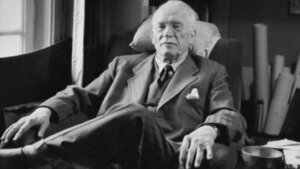Some Curious Facts About Carl Jung


Reviewed and approved by the psychologist Gema Sánchez Cuevas
Carl Jung remains one of the most interesting figures in the history of psychology. However, his bold theories had more impact on philosophy and art than on psychology itself or psychiatry. Nevertheless, some of his concepts also left a decisive mark on the sciences of the mind.
One curious fact about Carl Jung was the way he wrote. It’s almost as if he were writing for himself, without the slightest intention of being understood by others. For this reason, many think that several of his works weren’t intended to offer a coherent discourse, but were the fruit of a curious mind that wanted to continuously delve into one idea after another.
“Great talents are the most lovely and often the most dangerous fruits on the tree of humanity. They hang upon the most slender twigs that are easily snapped off.”
-Carl Jung-
Carl Jung’s life had many ups and downs. There were moments of great brightness and those of extreme darkness. He’s best remembered for his high-profile breakup with Sigmund Freud. He’s also renowned for having combined many mystical elements in his own analytic practice. Indeed, the Swiss psychoanalyst was all this and much more.
Some curious facts about Carl Jung
Carl Jung had an older brother who died shortly after birth, which meant his parents were devoted to him. Both his grandfather and his great-grandfather were prestigious German doctors. His father was a philologist , but abandoned his profession to become a clergyman. At the end of his life, shortly after Jung began studying medicine, he took his preaching to a psychiatric hospital.
Carl Jung’s mother suffered from a dissociative personality. This meant she didn’t always live in reality. Carl’s father taught him Latin when he was only six years old. This allowed him to delve into the world of ancient literature, which became a source of fascination for him.
Jung studied at boarding school but was a victim of the jealousy of his classmates. In fact, his famous fainting spells date back to that time. Indeed, every time he faced strong social pressure, he fainted. He was quiet and reserved, and he had practically no friends, but he was never bored. His intellectual curiosity was insatiable.
More curious facts about Jung
Seances were frequently held at Carl Jung’s house. He himself witnessed an event that really interested him. A walnut table suddenly split in half, in front of several witnesses. This and other facts motivated him to investigate the so-called occult phenomena and he kept one foot in the parapsychology camp for the rest of his life.
Jung married Emma Rauschenbach and stayed with her until she died. They had five children. One of them, Agatha, became a medium. However, Carl wasn’t an exemplary husband and even his analytical skills were doubtful. His affair with one of his patients, Sabina Spielrein-Scheftel, was the talk of his social circle for several years.
One of the most curious facts about Carl Jung’s life occurred at the time of his death. It happened when he was 85 years old, during a quiet afternoon in the town of Küsnacht, Switzerland. Just as he died, lightning split his favorite tree in the garden, under which he used to rest, in half. Furthermore, his friend, Lawrence Van der Post, who was returning to Europe from Africa and unaware of Jung’s death, dreamed that he saw Jung on top of the Matterhorn, waving and calling out “I’ll be seeing you”.
A near-death experience
Carl Jung had a near-death experience in 1944. It happened after he fractured his fibula while ice skating. As he was undergoing surgery, he suffered a cardiac arrest and, in his own words, was “about to cross the threshold”.
In his autobiography, Jung claimed that he saw himself floating over Ceylon (Sri Lanka). He was able to observe everything from above and even perceived the spherical shape of the Earth. Jung defined the experience as ” the ecstasy of a non-temporal state in which present, past, and future are one”.
He had the feeling of reconnecting with what he described as ‘the essential Jung’ and was certain that he was going to access a higher level of understanding. However, as he was about to cross the threshold, a likeness of his doctor appeared and told him he must return to Earth.
Jung felt deeply disappointed at having to return, and there can be little doubt that this experience nurtured his already mystical and complex world.
All cited sources were thoroughly reviewed by our team to ensure their quality, reliability, currency, and validity. The bibliography of this article was considered reliable and of academic or scientific accuracy.
- Cruz-Campos, M. I. (2017). Experiencias Cercanas a la Muerte.
- Grisales, D. E. A. (2020). El presente eterno de Jung. Revista Universidad de Antioquia, (341), 194-195.
- Jung, C. G. (2013). The essential jung. In The Essential Jung. Princeton University Press.
- Jung, C. G., & Wilhelm, R. (2020). El secreto de la flor de oro: un libro de la vida chino. AMA.
This text is provided for informational purposes only and does not replace consultation with a professional. If in doubt, consult your specialist.








